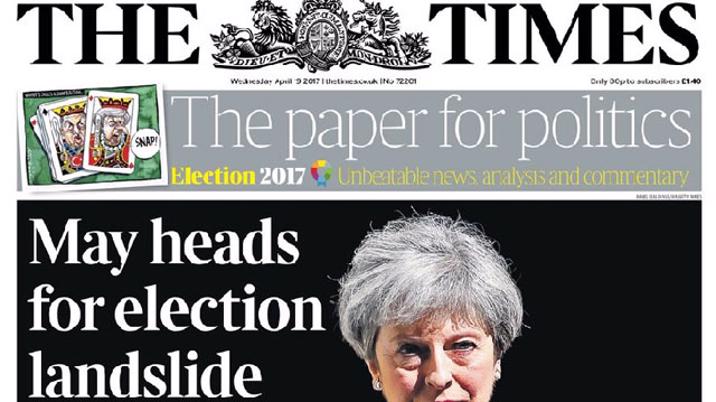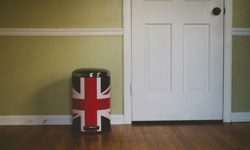
Within an hour of the EU referendum result, Sun editor Tony Gallagher was crowing to the Guardian: “So much for the waning power of the print media.” But that chicken came home to roost last month when, for all their efforts, Brexiteer papers were unable to deliver the expected Commons majority for Theresa May.
It had all seemed straightforward when she made her Erdogan-style pitch for an elected dictatorship in April. Conveniently forgetting the 16m who voted Remain and 12m who abstained, May had claimed that “the whole country” was behind Brexit, and MPs should be too. With the Tories 24 points ahead in the polls and Jeremy Corbyn’s approval rating at -42, the result was a foregone conclusion.
“Blue Murder” cried the Sun, “PM’s snap poll will kill off Labour”. The Times was equally sure, announcing “May heads for landslide”, while the Mail relished the opportunity to “Crush the saboteurs” – ie, any MP with the temerity to question the Dacre-approved interpretation of the Brexit vote.
With the actual vote a mere formality, no one seemed to take the election seriously: Labour’s opening gambit was to offer four more bank holidays, the Tories’ to bring back fox-hunting. These were clearly issues at the front of every voter’s mind.
The biggest-selling papers were equally relaxed. After an initial flurry of favourable Theresa headlines, the campaign barely made the front pages. The Mail was more interested in wayward doctors, the Express in dementia and diabetes, the Sun in footballers and giant bunnies dying on transatlantic flights. The Mirror had a couple of pops at May, but was more focused on dead babies. And they all dropped everything for the latest Madeleine “breakthrough” that magically surfaced in time for the tenth anniversary of her disappearance, but which has yet to yield any further results.
The local elections reinforced the air of confidence. “Theresa on the march” proclaimed the Mail, there was a “Great Tory rebirth” in the Telegraph, and The Times repeated its earlier prediction: “May on course for landslide”.
Who backed who
The Times did at least attempt to report the campaign with some level of impartiality; only the i was more even-handed. These two and the Guardian also acknowledged the existence of the LibDems and the Greens, parties almost entirely ignored by the Telegraph and the tabloids. They preferred to treat the campaign as a presidential run-off.
The Sun, Mail, Mirror and Express were all shamelessly partisan, mixing up news, speculation and comment. There were sins of commission – Labour tax “policies” that were pure invention - and of omission – having “crusaded” for years against hospital parking charges, the Express declined to report that Labour intended to abolish them.
Diane Abbott’s car-crash interview on LBC was given double-page spreads all over the place, as was Jeremy Corbyn’s struggle on Woman’s Hour. But when the chancellor was £20bn out on the cost of HS2 in the Today programme’s prime interview slot and Michael Gove got in a muddle over NHS charges for migrants, barely a sentence appeared in print.
May’s mistakes were glossed over or ignored, the “dementia tax” being the prime example. On May 1, the Mail led with a story headlined “Elderly care tax breaks lifeline”. It couldn’t have been more wrong. When the manifesto spelt out the Conservative social care funding policy a couple of weeks later, it was still positive: “You won’t have to sell home to pay for your care”. And when that didn’t go down too well, it came back with, “At last, a PM not afraid to be honest with you”.
The Express, the paper most concerned with such issues, trumpeted “May’s plan for a fairer Britain” and responded to the ensuing outcry with a small inside story headlined “May blasts critics”. The next day, in what was possibly the most cynical piece of “science” reporting, it splashed on “Alzheimer’s cure hope”.
The Tory tabloid trio learnt two lessons from the success of their Brexit campaigns:
• one-sided reporting, bordering on propaganda, works
• when the going gets tough, play the immigration card.
But they were too blinkered to learn from the failure of David Cameron’s Remain strategy:
• voters don’t like Prime Ministers taking them for granted
• a negative message brings negative results.
Project Fear – Mark 2
Having mocked “Project Fear” last year, the three tabs and the Telegraph went full throttle on Jezza Jeopardy. And when the poll gaps narrowed as Corbyn was seen openly engaging with voters in their thousands while May huddled in closed encounters with handfuls of supporters, the attacks became more fevered:
Corbyn’s manifesto to take Britain back to the 1970s, Corbyn to bankrupt Britain, Corbyn to open Britain’s doors even wider, Corbyn’s sly death tax, Corbyn’s kick in the teeth for IRA victims, Corbyn doesn’t believe in Britain, Corbyn’s plot to bring in migrant workers, Corbyn puts UK at terror risk, Corbyn’s la-la land, Corbyn plans to put 1m in top tax bracket, Corbyn accused of honouring Palestinian terror chief, Corbyn in IRA furore…
And these were just some of the front-page lead headlines; inside there was page after page of this stuff. They just about avoided blaming him for the terrorist attacks in Manchester and London, but found him culpable for atrocities all over the world over the previous 30 years. This culminated on election eve in thirteen straight pages from the Mail, starting with a splash that denounced Corbyn, John McDonnell and Diane Abbott as “Apologists for terror”.
But it didn’t work.
May won the election, but she lost her majority. Her party is now behind in the polls for the first time and her own approval ratings are deep in negative territory, while Corbyn’s on the up.
Print vs Social Media
So, does this mean that the power of the printed media is, after all, waning? Possibly.
It is certainly true that the power of social media is waxing.
Post-election polls by YouGov and Lord Ashcroft – both with huge samples in the tens of thousands – appear to confirm that young voters were a big factor in Labour’s resurgence. It is well-documented that younger generations would rather get information from the web than buy a newspaper, and Labour was more astute than the Conservatives in using Twitter, Facebook and other social sites to bypass editorial filters and get its message direct to voters.
But it would be a mistake to think that accessing material online is the sole province of the young. The referendum has left millions of people feeling politically homeless – and made them more willing to seek out and spread news reports and commentary from a wide range of sources. In this world, a blog post or story from The Canary or Guido Fawkes is as likely to find an audience as a BBC report or an FT op-ed column.
The interesting thing is whose work is shared and how. As the Mail noted in its rant about “fake news and the fascist left” last month, the Guardian may have a small circulation, but its material is shared on the internet: Owen Jones and Polly Toynbee reach thousands who don’t take their paper. But web users are just as (or even more) inclined to share an article to mock or debunk it as they are to commend it – as Express readers note, to their fury, when Remoaners “hijack” their leading-question anti-Europe polls.
Flailing around for an explanation for what it could only view as the election disaster, the Mail has attacked virtually every other source of information, with the “biased” BBC and “uncontrolled” tech giants at the top of the list. But that is to ignore the fact that the Mail is a web giant too – Mail Online is the most widely read news website in the world.
The veteran political journalist Nicholas Jones – who thought the reporting of the election was the vilest of his lifetime - was among several writers who saw the result as proof that the tabloids have become paper tigers whose roar doesn’t reach the ears of the young but merely reinforces the views of an ageing readership. In a blog post a few days after the election, he described May as the victim of her tabloid champions, trapped in the echo chamber of a phoney propaganda war.
That’s an interesting point. Social media is frequently described as an echo chamber; we see the posts of people whose opinions we share. But so it is, too, with newspapers. The Sun is a Tory paper with many Labour-voting readers, but the Express, Mail and Telegraph are all preaching to the choir. Their readers are always going to vote Conservative. Whose minds are they going to change?
Setting the agenda
In an interview with the New York Times a couple of months ago, Tony Gallagher seemed to backtrack on his crowing Brexit text about the power of the Press. This time, he suggested that its influence was limited, residing in its capacity to set the news agenda - in that broadcasters reviewed the papers and followed up their stories.
But that is hardly limited. It means they are reaching an audience far beyond their readership – and their screaming headlines are seen in shops everywhere by people who will never part with their money to read the full article.
Professor Steven Barnett of Westminster University agrees with Gallagher on newspapers’ ability to set the news agenda, but believes their influence goes beyond that, not least because their writers appear as pundits on political and current affairs programmes.
Newspapers can also devote resources to a brand of journalism untrammelled by the rules of impartiality that bind broadcasters, so they can pursue particular stories to suit a political agenda. Finally, Barnett cites research showing that people still pay far more attention to material read in hard copy than on screen.
Denied at the last?
Further evidence that papers still have clout comes from within the Labour party. One activist’s experience on the doorsteps, coupled with analysis of post-election polling data, has led him to believe that had it not been for the “incredible assault from the right-wing press” in the last few days of the campaign, Corbyn would now be in No 10.
Pete Heskett, director of the marketing and strategy company Hatch the Plan, noted a huge swing towards Labour through the campaign that suddenly reversed just before the vote. That coincided with a “massive bounce back” for May’s rating over Corbyn on who would make the best prime minister. “I can’t believe this was the result of any great performance from her. Her reaction to the London Bridge terror attack was to politicise the atrocity, but I don’t believe that this would have been enough to overcome her poor performance in the campaign.
“It wasn’t that May’s rating stabilised, it was that Corbyn’s absolutely tanked in the last couple of days, actually hitting a lower level than it had been pre-campaign, when everyone said he was a dead duck. This I believe is the data that highlights that newspapers did, in fact, have a decisive impact on the election.”
Would Corbyn have got across the line without that all-out assault? The chances are we’ll be back in the autumn for a re-run and maybe we’ll find out then. One thing is sure: whoever leads the Tory party will have the unswerving support of the Express (in the space of a week last summer, it lined up behind Gove, Johnson, Leadsom and May), the Mail and, most likely, the Sun.
They’ve already started as they mean to go on – essentially bash Corbyn and find “Look over there!” stories when the compelling news is inconvenient.
The Queen in mufti for the state opening of parliament is by any standards a shoo-in front-page picture, but was strangely absent from the Three Brexiteers’ covers. Could it have been that “EU flag” hat? They must have heaved a sigh of relief at the Express when she popped back to the Palace to change into bright yellow for Ascot.
And that £1bn deal with the DUP to keep May in power?
Who cares when you can write about leftie school heads, lesbian jail romps or a diabetes cure?










